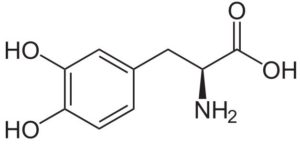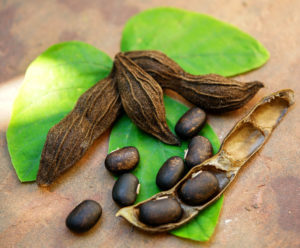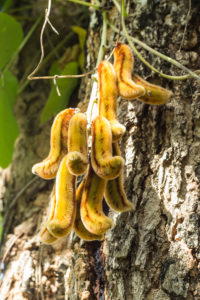Table of Contents
Key Takeaways
- L-DOPA is a vital amino acid precursor of neurotransmitters dopamine, epinephrine, and norepinephrine synthesized in the brain from l-tyrosine.
- Mucuna Pruriens is a natural source of L-DOPA, used as a nootropic to enhance brain function by increasing dopamine levels.
- L-DOPA from Mucuna Pruriens can improve memory, cognition, mood, and overall brain health while reducing stress and acting as an antidepressant.
- Opt for organic Mucuna Pruriens extract with higher L-DOPA concentrations (15% – 30%) to ensure better tolerance and efficacy, avoiding synthetic versions used for Parkinson’s treatment.
- Nootropic use of L-DOPA is generally safe and well-tolerated, but caution is necessary to avoid tolerance and dependence issues.
See my article on all of the supplements that have been shown to help with Parkinson’s here: Best Supplements for Parkinson’s Disease
L-DOPA (levodopa, L-3,4-dihydroxyphenylalanine) is an amino acid synthesized in your brain by the amino acid l-tyrosine. L-DOPA is a precursor of several neurotransmitters including dopamine, epinephrine, and norepinephrine.
Mucuna Pruriens contains naturally occurring L-DOPA in high concentrations. And is used as a nootropic because dopamine itself cannot cross the blood-brain barrier.
Dopamine and norepinephrine are essential for memory, cognition, and a positive mood. A lack of either of these neurotransmitters can lead to a lower mood state, loss of memory, brain fog, poor energy, and more. And if left unchecked will eventually result in neurodegenerative diseases like Parkinson’s.
L-DOPA helps:
- Brain Health. L-DOPA helps to increase growth hormone levels in the brain. Boosting the production of neurons and glia cells affecting the formation of memories, and overall brain health.
- Neurotransmitters. L-DOPA is a necessary precursor for your brain to make dopamine. And dopamine is then synthesized into the neurotransmitters epinephrine, and norepinephrine. Affecting cognition, learning, memory, movement, motivation and pleasure.
- Neuroprotection. L-DOPA produces neuromelanin which is similar to the melanin pigment in your skin. In your brain they absorb toxic quinones, and chelate heavy metals like mercury and lead.
What is L-DOPA (Mucuna Pruriens)?
L-DOPA (levodopa, L-3,4-dihydroxyphenylalanine) is an amino acid that’s naturally synthesized in your brain by the amino acid l-tyrosine.

L-DOPA is a necessary precursor to the synthesis of the neurotransmitter dopamine. Called a catecholamine, dopamine is then synthesized into the other catecholamines epinephrine (adrenaline) and norepinephrine (noradrenaline).
Unlike Dopamine, L-DOPA can cross the blood-brain barrier. This is why we supplement with L-DOPA rather than dopamine.

And for a dopamine boost, neurohackers use Mucuna Pruriens, which contains high levels of L-DOPA.[i] This legume, native to the tropical regions of India, Africa and the West Indies, and also known as velvet bean, has been used in Ayurveda medicine since 1500 B.C.
The ancients used Mucuna Pruriens to treat things like snakebite, intestinal problems, sexual issues, and a melancholy mood.
Raising levels of the neurotransmitter dopamine in your brain helps regulate mood and cognition.[ii]
Mucuna Pruriens vs. L-DOPA: What’s the Difference?
Mucuna Pruriens is an extract of the velvet bean plant that grows 3 – 18 meters in height. L-DOPA (levodopa) is usually synthetic and made in the lab.
The natural version of L-DOPA from Mucuna Pruriens is generally well-tolerated by most people. And the compounds in the plant are bio-identical to those chemicals naturally made in your body. Not so with synthetic L-DOPA.
Synthetic L-DOPA is metabolized into dopamine in your body by an enzyme called aromatic L-amino acid decarboxylase (AADC). And the majority of synthetic L-DOPA will be converted peripherally (not in the central nervous system and brain). This can cause problems.
So when used therapeutically, as in treating Parkinson’s Disease, L-DOPA is administered in combination with an inhibitor of peripheral AADC. Drugs like carbidopa (or other AADC inhibitors) ensure most of the L-DOPA is preserved for conversion to dopamine in the brain. And not the rest of your body.
This is critical for nootropic users to keep in mind. Chronic, or prolonged use of synthetic L-DOPA can lead to things like dyskinesia. This is a movement disorder where neurological discoordination results in uncontrollable, involuntary movements.[iii]
I am not telling you this to dissuade you from using L-DOPA. Stick with an extract of Mucuna Pruriens and you should be fine.
How does L-DOPA Work in the Brain?
L-DOPA boosts brain health and function in several ways. But two in particular stand out.
- L-DOPA improves memory. It’s metabolized into dopamine in your body by an enzyme called aromatic L-amino acid decarboxylase (AADC). This increases dopamine levels in your brain.
Researchers at the University of Münster in Germany conducted a study with 40 healthy people. In this randomized double-blind study, they gave one group 100 mg of levodopa daily for 5 days. The other group took a placebo.
90 minutes later on each day, subjects were given a memory test based on vocabulary. The study found that levodopa significantly enhanced the speed, overall success, and long-term retention of novel words.[iv]
- L-DOPA promotes brain health. Research suggests Mucuna Pruriens protects your brain by regulating cognitive and neural functions. And even encouraging neural activity.
Researchers in India showed that Mucuna Pruriens is a potent antioxidant. They performed assays to evaluate the enzymatic and nonenzymatic antioxidants in extracts. They found high levels of flavonoids, alkaloids, tannic acids, gallic acids, quercetin equivalents, and sitosterol equivalents.[v]
All of these compounds scavenge for free radical in your brain. Free radicals are formed during normal brain activity, like the synthesis of ATP that is produced in your mitochondria.
Your brain is equipped to eliminate some of these free radicals on its own. But especially in today’s environment in which we live, your brain is overwhelmed. Free radicals cause inflammation which damages and can kill brain cells. Affecting memory, learning, recall, cognition and mood.
Mucuna Pruriens has been proven to be a very effective brain inflammation fighter. It even has the ability to chelate heavy metals like mercury and lead in brain cells. And it’s antibacterial.[vi]
Mucuna Pruriens helps your brain make naturally occurring neuronal pigments called neuromelanin’s. They’re similar to the melanin found in your skin. And they’re often found in regions of your brain where dopamine is active.
The synthesis of neuromelanin’s in the various regions of your brain is an important protective process. The melanic component is generated through the removal of reactive/toxic quinones that would otherwise cause neurotoxicity.
This melanic component promoted by Mucuna Pruriens is what chelates and accumulates toxic, heavy metals like mercury and lead.[vii] Preventing them from damaging brain cells.
How things go bad when you have low dopamine
As we get older, our brain chemistry and energy metabolism changes.
↓ Dopaminergic neurons are damaged or die
↓ Dopamine levels decline
↑ Stress levels increase
↓ Long-term memory and mood decline
All of these age-related changes are contributing factors to the neurodegenerative diseases of aging, including Parkinson’s Disease.
L-DOPA benefits for brain health
Mucuna Pruriens natural herbal supplement extract contains high levels of L-DOPA, the precursor to the crucial neurotransmitter dopamine. Dopamine is further synthesized into the neurotransmitters epinephrine (adrenaline) and norepinephrine (noradrenaline).
Dopamine plays a critical role in learning and absorbing new information. Increasing brain levels of dopamine helps regulate mood and boosts cognition.
Research also suggests that Mucuna Pruriens provides antioxidants that defend against oxidative damage caused by free radicals.[viii]
How does L-DOPA feel?
Neurohackers report that using Mucuna Pruriens helps in multi-tasking, improving motivation, more focus, less stress, and a sense of calm.
You could find your energy levels increase, less brain fog, and a boost in overall mood. A more positive outlook on life. And an increase in libido.
L-DOPA Clinical Research
Mucuna Pruriens (L-DOPA) as an
alternative for Parkinson’s Disease
Researchers at the Parkinson’s Institute located at the University of Milan in Italy recruited 18 patients with advanced Parkinson’s Disease. The patients were given either ground Mucuna Pruriens powder (standardized 5.7% L-DOPA) or prescription form of levodopa containing a dopa-decarboxylase inhibitor. And then measured motor improvements at 60 and 90 minutes after using the supplement or drug.
The researchers found Mucuna Pruriens standardized powder produced reduced Parkinson’s symptoms equivalent to the prescription version of levodopa. But with significantly fewer problems with dyskinesias. The team concluded the “Clinical effects of high-dose Mucuna Pruriens were similar to levodopa alone at the same dose, with a more favorable tolerability profile“.
Mucuna Pruriens reduces stress
A study was conducted to assess the role of Mucuna Pruriens in infertile men. It was done at King George’s Medical University in Lucknow, India. The study included 60 men who were undergoing infertility screening. And no surprise here; were found to be suffering from stress.
The control group in this study were 60 age-matched men who had initiated at least one pregnancy. The infertile men were given 5 grams of Mucuna Pruriens seed powder per day for 3 months. Semen samples were collected at the beginning of the study. And after 3 months of treatment.
The researchers found that treatment with Mucuna Pruriens significantly decreased stress levels. And increased sperm count to the same level as the fertile control group of men.
They “concluded that M. pruriens not only reactivates the anti-oxidant defense system of infertile men but it also helps in the management of stress and improves semen quality.”[ix]
L-DOPA improves learning
This study in Germany was done with 40 healthy subjects. They were given 100 mg of L-DOPA or a placebo for 5 days in a randomized, double-blind trial.
Subjects were trained on artificial vocabulary using a high-frequency, repetitive approach. This was done 90 minutes after L-DOPA administration on each day of the trial.
The researchers found that L-DOPA significantly enhanced the speed, overall success, and long-term retention of the words.[x]
L-DOPA as an anti-depressant
Increasing dopamine in your brain also boosts your mood and libido. This study was done in India with mice. Researchers used the well-known Forced Swimming Test (FST), Tail Suspension Test (TST), and Chronic Unpredictable Mild Stress (CUMS) test.
The mice were fed Mucuna Pruriens seed extract, and then evaluated while performing, well… what mice do in the lab. The research team found that Mucuna Pruriens seed extract has significant antidepressant qualities. Which would simply verify what we already know in humans.[xi]
Using Mucuna Pruriens extract is a great anti-depressant.
L-DOPA Recommended Dosage
L-DOPA (Mucuna Pruriens extract) suggested dosage for cognitive benefits is 250 – 500 mg twice per day. Most Mucuna Pruriens extracts only contain 15 – 20% L-DOPA. So you may need to adjust your dose up or down depending on how you respond to this supplement.
You may also find that you need to cycle the use of L-DOPA (Mucuna Pruriens). And use it only 4 or 5 days a week. This can help avoid tolerances and dependencies (which are common with any dopamine agonist). DO NOT attempt to cycle this nootropic if you are using it to treat Parkinson’s Disease.
If you are using Mucuna Pruriens extract (L-DOPA) for Parkinson’s Disease you will likely need 500 – 1,000 mg Mucuna Pruriens 3 or more times per day. And look for a Mucuna Pruriens extract (98% L-DOPA).
See my article on all of the supplements that have been shown to help with Parkinson’s here: Best Supplements for Parkinson’s Disease
L-DOPA Side Effects
L-DOPA is produced naturally in your body. So is considered well-tolerated and safe. And L-DOPA from Mucuna Pruriens extract is particularly well tolerated by most people.
Research shows that the natural form of L-DOPA from Mucuna Pruriens compared to synthetic versions of L-DOPA provides similar results. But without the common side effects of nausea, vomiting, and involuntary muscle movement.[xii]
But be very careful when working with dopamine. Too much and you can experience symptoms like hair loss, auditory or visual hallucinations, psychosis, Dyskinesia and more.
Of course, if you begin to experience any of these side effects, stop supplementing with L-DOPA (Mucuna Pruriens) immediately.
Like any natural supplement, it’s always better to use an organic source.

Type of Mucuna Pruriens (L-DOPA) to buy
Mucuna Pruriens is typically available in powder, capsule or tablet form. Some are pure, dried Mucuna Pruriens powder.
Several manufacturers offer Mucuna Pruriens extracts ranging from 15% – 30% L-DOPA. Or they tell you how many mg of L-DOPA is in each capsule or tablet.
A few manufacturers call it “Velvet Bean Extract” or “Mucuna Extract” with the percentage of L-DOPA in each capsule or tablet. It’s the same as Mucuna Pruriens.
Try to find “organic” or “certified organic” if you can. And for Nootropic use, avoid synthetic L-DOPA which is typically used to treat Parkinson’s Disease.
Nootropics Expert Recommendation
L-DOPA (Mucuna Pruriens) dosage 250 – 500 mg twice per day
 I recommend using L-DOPA as a nootropic supplement.
I recommend using L-DOPA as a nootropic supplement.
Your body does synthesize some L-DOPA on its own. And converts it into the essential neurotransmitters dopamine, epinephrine, and norepinephrine.
But as you get older, dopamine receptors die or become unresponsive. Or your body doesn’t convert the necessary amino acids well enough to supply the neurotransmitters you need for an optimized brain.
L-DOPA is helpful to boost energy and motivation levels, memory, clear brain fog, improve mood and libido.
L-DOPA is especially helpful for those suffering from neurodegenerative diseases like Parkinson’s. And the natural form of L-DOPA from Mucuna Pruriens often offers better results with fewer side effects than prescription drugs.
I suggest starting with a dose of 100 – 250 mg twice daily for nootropic use at first. And you may find that you need to cycle L-DOPA. Use it for 4 or 5 days and take a break. Tolerance is often a problem when working with dopamine. As is dependence or addiction.
If you are using Mucuna Pruriens (L-DOPA) for Parkinson’s Disease, please see my article on all of the supplements that have been shown to help with Parkinson’s here: Best Supplements for Parkinson’s Disease









Join The Discussion - 413 comments
eric
March 24, 2019
thanks for all your info i appreciate !
take care !
Julie
March 24, 2019
Hi David,
Wow… so much info!
So, I’m ADHD (inattentive), and post menopausal (which makes symptoms worse), and untreated! So no surprise, reading all this is making my brain explode in complete confusion! haha!
I took the Organic Acids test a while back, which shows genetic tendencies and of course I’m super low in Dopamine and Norepinephrine. Translation, low energy and stupid. OK, not really stupid as we know ADHD folks are actually quite smart. But with untreated ADHD and very little estrogen, my brain doesn’t work very well.
Anyway, my MD recommended Effexor to raise norepinephrine levels. And which would help a myriad of other ADHD symptoms and some other issues going on. However researching Effexor, holy moly! Not sure I want to go down that road. I’m also not wanting to use Ritalin or Adderol if possible.
So, can I just take L-tyrosine to raise dopamine and norepinephrine. Can I add L-Dopa? And for sleep, currently I take 3mg of melatonin, but yeah, I’m pretty fuzzy in the morn. Now I’m wondering about Tryptophan instead.
I’m trying to keep it super simple, brain balanced and affordable. Any wisdom would be greatly appreciated!
Thanks so much!
Julie
David Tomen
March 25, 2019
Julie, I used the protocol outlined on the following page for exactly a year while NOT using Ritalin or any prescription stimulant. And it managed my Adult ADD beautifully: https://nootropicsexpert.com/best-nootropics-for-adhd-add/
3 mg of Melatonin is way too high a dose for most people. You are better off using a natural source of Melatonin like Tart Cherry Juice. Or L-Tryptophan which will help naturally make melatonin in your brain. More on sleep here: https://nootropicsexpert.com/best-nootropics-for-sleep/
Judy
February 15, 2024
What about 3 mg of “time released” melatonin? Or even 2 mg of “time released”?
David Tomen
February 15, 2024
Judy, 1. your brain only uses 0.5 – 0.8 mg melatonin during the night. And 2. it is nearly impossible to get an accurately dosed melatonin supplement. At least two studies show nearly all of the melatonin supplements on the market are mislabeled. Even from trustworthy manufacturers. I still stand by recommending L-Tryptophan instead if you don’t want to use Tart Cherry Juice concentrate.
eric
March 19, 2019
i have questions about the l-dopa in the mucuna.
im sensitive when a take medication i have to take kids dosage or start very low anything so what is a low dosage of mucuna in mg of l-dopa ? 50mg of standardized l-dopa are a low dosage ?
i see on internet if you take mucuna is dangerous to destroy the the tyrosine hydroxylase this are true ?
thanks
David Tomen
March 20, 2019
Eric, 50 mg of Mucuna would be considered a dosage on the very lower end. And don’t believe everything you read on the Internet. 🙂
Tyrosine hydroxylase is the enzyme needed to convert L-Tyrosine into L-DOPA. Then the enzyme aromatic amino acid decarboxylase converts L-DOPA to dopamine. So the first step you mention doesn’t “destroy” the enzyme. It’s simply not needed. https://www.ncbi.nlm.nih.gov/pmc/articles/PMC3065393/
eric
March 21, 2019
thanks for the answer you reassure me about what i read for the tyrosine hydroxylase.
for the mucuna i buy 2 different brand and (bacopa monnieri for futur test) in case of custom block again my mucuna because is not legal in canada. last time with iherb i receive only 2 item and not my mucuna.
Sorry in my last post i make mistake about the dosage of mucuna i buy a 20% l-dopa version (100mg l-dopa avg if my conversion was good) this is a low dosage ? is better for me to take half capsule or not because im sensitive ?
for you info im autism,adhd,anxious etcs..i try many many medication with my doctor and im very atypical.
sorry for my english im french and thanks ! also you look very educated and serious .
David Tomen
March 23, 2019
Eric, Mucuna Pruriens extracts range from 15% – 98% so 20% is on the lower end. Some manufacturers also include how many mg of L-DOPA it works out to.
If you are extremely sensitive to supplements I’d try a half dose and see how you feel just to be safe.
eric
March 23, 2019
ok im gonna start with half capsule of mucuna of 20% in case .
if i use the info of different manufacturer every 10% of l-dopa are 50mg l-dopa ? the conversion is good ? i have to give the info to my doctor when i gonna try mucuna.
i have 2-3 question about the bacopa if im not sure after my search. Im gonna send my question in the bacopa section in few days.
thanks and continue your good job to explain and reassure people. and sorry for my bad english.
David Tomen
March 24, 2019
Eric, not completely sure about the conversion because that is more of a question for the manufacturer. It’s likely close enough to share with your doc however.
Bob
February 25, 2019
Hi David,
I’ve battled GAD and MDD for about 8 years. For the first 4-5 years I mainly experimented with nootropics and had some success with that approach. Eventually, I grew frustrated with the endless combinations and inconsistencies so reached out to a psychiatrist and therapist and have been trying that route for about the last three years. I get by relatively well on a daily basis and feel more consistent as a result of being on an SSRI (Zoloft at 100mg for 3 months) which renders the GAD basically nonexistent and puts a damper on the MDD. I do yoga daily and eat a healthy, balanced and clean diet. No alcohol or recreational drugs. I take a Garden of Life Multi, Vit D and Omega 3 on a daily basis and then occasionally add in a Probiotic and Magnesium too.
From what I understand, it’s fairly common for people on SSRI’s to experience a certain amount of emotional and/or physical “flattening”. No matter what I do, I can’t seem to get the natural highs that I desire. Things like listening to great music, sex, a great conversation, food, and basically anything that should elicit an emotional response don’t give me that spark I desperately desire.
Based on your articles, it seems highly likely that my Dopamine/NE have been compromised as a result of being on the SSRI. Does this make sense to you? I’m open to taking pharmaceuticals or nootropics to try to offset the deficiency. I’ve enjoyed the effects of L-Dopa / Mucuna Pruriens in the past. My psychiatrist offered to increase the Zoloft to 150 but I’m thinking I’d prefer to try the nootropic route and experiment with my Dopamine/NE hypothesis before messing any more with Serotonin. I’m aware of the faint Dopamine inhibition in Zoloft so it’s possible I could get lucky. I think she would also be open to trying Wellbutrin as an NDRI if I provide a decent amount of conviction. Any other suggestions you might have?
Thank you!
David Tomen
February 26, 2019
Bob, what you describe is a very common side effect of antidepressants. Be careful about what you decide to try in the way of nootropics because of possible contraindications. Best way to find out ahead of time is to learn the exact mechanism of action for the drugs you are using.
Mucuna many help. I suggest checking out the reviews I’ve done recently for Maca and Saffron. One or the other or both as I recall helped with reducing some of the side effects of antidepressants.
Bob
February 26, 2019
Thank you!
CLEON
January 19, 2019
Hello, I take Citalipram 40mg daile and trazodine 150mg daily, Will Mucuna interfere with these 2 drugs. My Practitioner said she was unsure. and to start at a low dose of mucuna and see if it is tolerated. I plan to get the now version of mucuna. I really soaked in a lot of information from your presentation. Thank You.
David Tomen
January 20, 2019
Cleon, both Citalopram and Trazadone affect serotonin and its receptors. Mucuna affects dopamine and its receptors and transporters. I’m not aware of any contraindication between this nootropic and those drugs.
But remember that dopamine and serotonin need to be in balance. Mucuna will raise dopamine but the pharmaceuticals will not raise serotonin. They only make serotonin more effective. So you could run into a problem with dopamine overpowering serotonin at some stage. Which can cause problems.
Frank
January 8, 2019
Do you think there are dangers of taking mucuna if you also take Ritalin?
David Tomen
January 8, 2019
Frank, Mucuna provides L-DOPA which is the precursor to dopamine synthesis in your brain. Ritalin prevents the reuptake at dopamine receptors. So Mucuna should potentiate Ritalin.
But not everyone needs a direct precursor to dopamine. I think older guys and gals would get more benefit from using Mucuna in this scenario than younger people.
Heidi
January 7, 2019
Hello, I am a 37 year old female with adult add. I am prescribed vyvanse, and take it once a day every morning. I have purchased the Now brand Dopa Mucuna in order to replenish lost dopamine
I am only on day 2 of the dopa. I have also been balancing out serotonin via a small 50mg dose of 5htp at bedtime.
I am not on any other medications or supplements. Do you think that this regiment will help to make my vyvanse work at a steady, consistent rate. What other advice can you give. I worked in pharmacy for 16 years, however, supplements (natural or otherwise) are not what is taught.
David Tomen
January 7, 2019
Heidi, you’re on the right track with Mucuna. The Adult ADD regimen described in this post is followed by thousands around the world because it works: https://nootropicsexpert.com/best-nootropics-for-adhd-add/
Heidi
January 7, 2019
David, thanks for the fast response! I am sure I am not in the minority when it comes to the frustrations of ad(h)d medications, while also tying to do what is best for our bodies withoutout any permanent damage. There is still so much to be learned about the brain. But we must help each other as best we can with the little knowledge we have, scientifically speaking….along with trusting our gut instincts. Thank you so much for your knowledge and experience.
Side note— One thing I have notice that was unexpected with the Dopa Mucuna- maybe you can weigh in to help others. It makes me very tired. I was expecting the opposite. Have you heard of this?
David Tomen
January 8, 2019
Heidi, not sure why Mucuna would cause fatigue but I’m sure there’s evidence of this someplace. Because the label on the Himalaya Mucuna I got from Whole Foods says to take it before bed. I personally dose it in the morning and at noon without any fatigue issues.
You may want to try NALT or L-Tyrosine in that case for boosting dopamine.
Yevgeny
December 11, 2018
Thank you for a great article, very informative.
I’m having a bit of trouble figuring out if a product I’m looking at is Mucuna Pruriens extract, or synthetic. Could you help shed some light on this?
The product I’m referring to is the Health Factors 99.6% L-Dopa Mood enhancer.
Thanks in advance,
Yevgeny
David Tomen
December 12, 2018
Yevgeny, I’m not familiar with the company “Health Factors” and know nothing about the quality of their product. I suggest finding the manufacturers website and finding out more about their testing procedures and where they source their raw materials from.